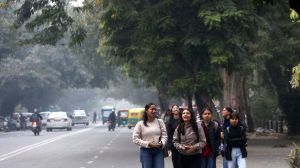Seshadri demoted by RSS hawks
NAGPUR, MARCH 12: In a thorough revamp of the Rashtriya Swayamsevak Sangh on the final day of the crucial Pratinidhi Sabha in Nagpur today...

NAGPUR, MARCH 12: In a thorough revamp of the Rashtriya Swayamsevak Sangh on the final day of the crucial Pratinidhi Sabha in Nagpur today, the powerful general secretary, H V Seshadri, was demoted to the post of joint general secretary, which he will share with Madandas Devi. Mohan Bhagwat, an young turk, was elevated to the key post of general secretary.
Observers feel that with this reshuffle, yet another moderate element has been sidelined by the hawks in the RSS. The 74-year-old Seshadri, who served the organisation as Sarkaryavah for 12 years, will now have to work under the 50-year-old Bhagwat.
This is the second time in the organisation when the second-in-command has been demoted. Earlier, Rajju Bhaiyya was demoted from sarkaryavah and appointed as joint general secretary in 1988. He was then succeeded by Seshadri.
The meeting retained the RSS ideologue, Ranga Hari, as the chief of ideological cell (boudhikh pramukh). Suresh Ketkar, one of the joint general secretaries, was entrusted with the job of pracharak pramukh, a post earlier held by Bhagwat. Srikant Joshi was also retained in his post of prachar pramukh (publicity chief).
Rajju Bhaiyya, Moropant Pingle, Baburao Vaidya, Suryanarayan Rao and Vishwanathji would be special invitees in the new working committee.
Maharashtrians have bounced back into the all-important working committee by cornering a lion’s share of seven out of the 17 seats while two out of five seats in the special invitees’ section have also gone to them.
Founded by five Maharashtrians in 1925, the RSS had subtly shed its only Maharashtrians’ image to assume a pan-India identity, especially in the aftermath of the Shilanyas in Ayodhya. The move had paid rich dividends in the southern states with its political arm, the BJP, making swift and deep inroads into Karnataka, Andhra Pradesh and even the supposedly bi-polar Kerala.
During the six-year-long reign of Rajju Bhaiyya, this lobby was perceived to have got a raw deal. Veterans like Bharatiya Mazdoor Sangh ideologueDattopant Thengadi, were given the cold shoulder and kept out of the decision-making machinery, forcing him to sulk in private and give vent to his frustration, sometimes, in public. What annoyed Thengdi, observers say, was that he was kept totally in the dark about the RSS’s deals with the BJP and the way the parent body was guiding its political front.
With today’s comeback of the Maharashtrians, this lobby has regained the upper hand and may well dictate the organisation’s dealings with the BJP government.
Another striking feature of this revamp is the attempt to induct young blood. RSS ideologues are disturbed by the dwindling intake of intellectuals’ who once formed the pro-Hindutva body’s backbone. With today’s paradigm shift, they have again focussed on their recruitment drive to attract and retain talent. The rate of dropouts was said to be alarming and needed immediate attention.
In the first admission of its kind, senior RSS leader and joint general secretary Madandas Devi said there were many dropouts which was a cause for concern. “We will make an effort to staunch this by bringing in better and more committed swayamsevaks,” he said, hinting at a mass mobilisation drive.
The shakha, which is considered to be the nucleus of the mammoth sangh parivar, has also been suffering due to the dwindling attendance of swayamsevaks. This was the subject of a special debate at the three-day meeting and several measures were suggested to beef up attendance.
The pro-Hindu organisation which has around 30,000 shakhas in the country has been witnessing thin attendance for the past few years. The newly-nominated RSS supremo, K S Sudarshan, feels students have to take tuitions these days due to the tremendous pressure in the present education system and the timing of the shakhas doesn’t suit them; hence the poor attendance.
- 01
- 02
- 03
- 04
- 05































